With the mood in Damascus still celebratory, Assad’s prime minister, Mohammed Jalali, on Monday handed power to the rebel-led Salvation Government.

An armed rebel stands guard in front of an official building in Damascus, Syria, 9 December 2024. [EPA-EFE/HASAN BELAL]
Dec 10, 2024
The lightning overthrow of President Bashar al-Assad left Syrians, countries in the region and world powers nervous on Tuesday (10 December) about what comes next as the rebel alliance took its first steps in a government transition.
The United Nations Security Council met behind closed doors late on Monday, and diplomats said they were still in shock at how quickly Assad's overthrow unfolded over 12 days, after a 13-year civil war that was locked in stalemate for years.
"Everyone was taken by surprise, everyone, including the members of the council. So we have to wait and see and watch ... and evaluate how the situation will develop," Russian UN Ambassador Vassily Nebenzia told reporters after the body met.
Russia played a major role in supporting Assad's government and helping it fight the rebels. The Syrian leader fled Damascus for Moscow on Sunday, ending more than 50 years of brutal rule by his family.
Losing Syria is Putin's 'personal defeat', experts say
Russia will try to negotiate with Syrian rebels to maintain military bases and influence in the Middle East, experts say.
With the mood in Damascus still celebratory, Assad's prime minister, Mohammed Jalali, on Monday agreed to hand power to the rebel-led Salvation Government, an administration based in rebel-held territory in northwest Syria.
The main rebel commander Ahmed al-Sharaa, better known as Abu Mohammed al-Golani, met with Jalali and Vice President Faisal Mekdad to discuss the transitional government, a source familiar with the discussions told Reuters. Jalali said the handover could take days to carry out.
Al Jazeera television reported the transitional authority would be headed by Mohamed al-Bashir, who has headed the Salvation Government.
The steamroller advance of the militia alliance headed by Hayat Tahrir al-Sham (HTS), a former al-Qaeda affiliate, was a generational turning point for the Middle East.
The civil war that began in 2011 killed hundreds of thousands, caused one of the biggest refugee crises of modern times and left cities bombed to rubble, countryside depopulated and the economy hollowed out by global sanctions.
But the rebel alliance has not communicated plans for Syria's future, and there is no template for such a transition in the fractious region.
Oil prices rose more than 1% on Monday, partly on concerns that instability in Syria, which is not a major oil producer, could raise regional tensions, analysts said.
"This is an incredible moment for the Syrian people," Deputy US Ambassador to the UN Robert Wood said in New York. "Now we're really focused right now on trying to see where the situation goes. Can there be a governing authority in Syria that respects the rights and dignities of the Syrian population?"
The US was seeking ways to engage with Syrian rebel groups and is reaching out to partners in the region such as Turkey to start informal diplomacy, Washington said.
Qatari diplomats spoke with HTS on Monday, an official briefed on the developments told Reuters, as regional states race to open contact with the group.
'Freedom, equality, rule of law'Some insurgent fighters who milled about the capital on Monday, clustering in the central Umayyad Square, expressed hope a civilian administration would soon be running the country.
"We want the state and security forces to be in charge," said Firdous Omar, a fighter who intends to resume farming in provincial Idlib.
Golani has vowed to rebuild Syria, and HTS has spent years trying to soften its image to reassure foreign nations and minority groups within Syria.
But fears of reprisals remained. HTS said it will not hesitate to hold security and army officers involved in torturing the Syrian people accountable, describing them as criminals and murderers.
"We will release a list that includes the names of the most senior officials involved in the torturing of the Syrian people," Golani said in a statement. "Rewards will be offered to those who will provide information about senior army and security officers involved in war crimes."
HTS is designated as a terrorist organisation by many states and the UN, and its governing credentials are uncertain.
"Syrians are looking forward to establishing a state of freedom, equality, rule of law, democracy, and we will join efforts to rebuild our country, to rebuild what was destroyed, and to rebuild the future, better future of Syria," Syria's UN Ambassador Koussay Aldahhak told reporters.
There were tentative signs of a return to order. Syria's banks will reopen on Tuesday, and the oil ministry called on all employees in the sector to head to work on Tuesday, adding that protection would be provided to ensure their safety.
In one of many challenges facing Syria, Israel seized a buffer zone in the country's south, a move condemned by Egypt, Qatar and Saudi Arabia. Saudi Arabia said the move would "ruin Syria's chances of restoring security."
Israel said its airstrikes would carry on for days but told the UN Security Council that it was not intervening in Syria's conflict. It said it had taken "limited and temporary measures" solely to protect its security.
Syria's rebels work to form government



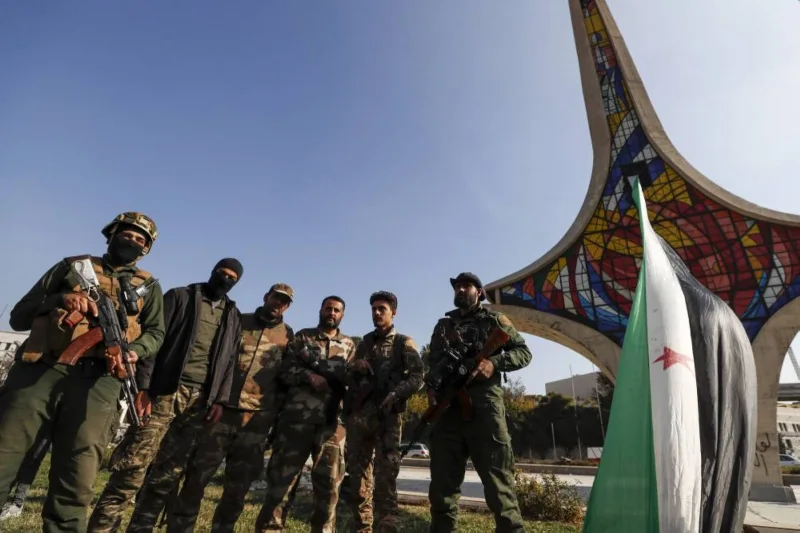
Syrian opposition fighters pose for a photograph as they celebrate at Umayyad Square in Aleppo, Syria, on Monday. AP
The lightning overthrow of President Bashar Al Assad left Syrians, countries in the region and world powerservous on Tuesday about what comes next as the rebel alliance took its first steps in a government transition.
The United Nations Security Council met behind closed doors late on Monday, and diplomats said they were still in shock at how quickly Assad's overthrow unfolded over 12 days, after a 13-year civil war that was locked in stalemate for years.
"Everyone was taken by surprise, everyone, including the members of the council. So we have to wait and see and watch ... and evaluate how the situation will develop," Russian UN Ambassador Vassily Nebenzia told reporters after the body met.
Russia played a major role in supporting Assad's government and helping it fight the rebels. The Syrian leader fled Damascus for Moscow on Sunday, ending more than 50 years of brutal rule by his family.
With the mood in Damascus still celebratory, Assad's prime minister, Mohammed Jalali, on Monday agreed to hand power to the rebel-led Salvation Government, an administration based in rebel-held territory in northwest Syria.
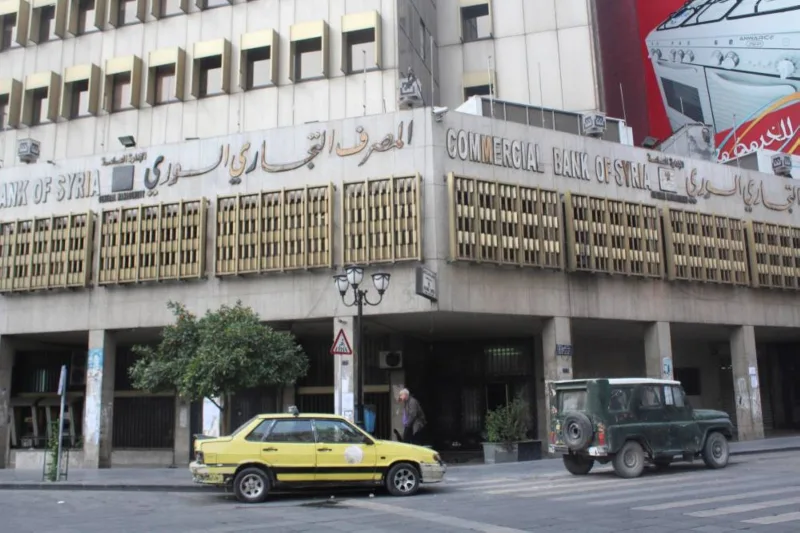
A man walks near the Commercial Bank of Syria in Damascus on Tuesday. Reuters
The main rebel commander Ahmed al-Sharaa, better known as Abu Mohammed al-Golani, met with Jalali and Vice President Faisal Mekdad to discuss the transitional government, a source familiar with the discussions told Reuters. Jalali said the handover could take days to carry out.
Al Jazeera television reported the transitional authority would be headed by Mohamed al-Bashir, who has headed the Salvation Government.
The steamroller advance of the militia alliance headed by Hayat Tahrir al-Sham (HTS), a former al-Qaeda affiliate, was a generational turning point for the Middle East.
The civil war that began in 2011 killed hundreds of thousands, caused one of the biggest refugee crises of modern times and left cities bombed to rubble, countryside depopulated and the economy hollowed out by global sanctions.
But the rebel alliance has not communicated plans for Syria's future, and there is no template for such a transition in the fractious region.
In an alarming development, Israel seized a buffer zone in the country's south, a move condemned by Egypt, Qatar and Saudi Arabia. Saudi Arabia said the move would "ruin Syria's chances of restoring security".
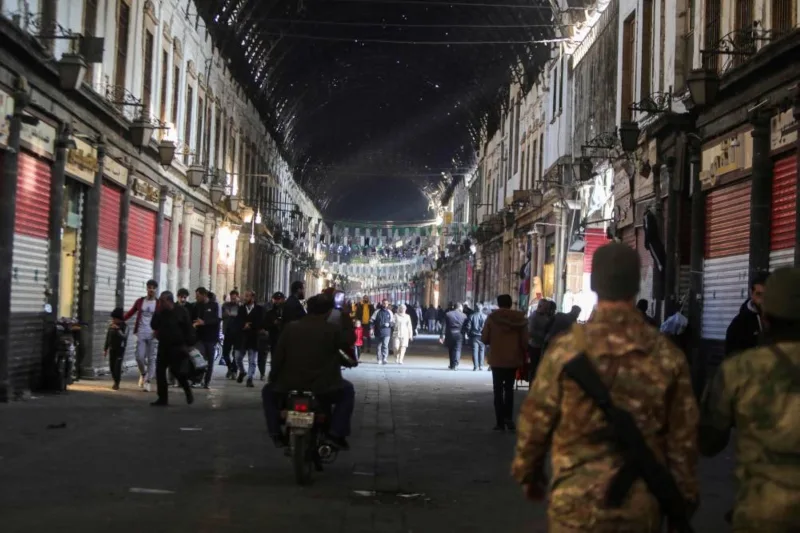
People shop at the Hamidiyeh market in the old part of Damascus on Monday. AFP
Regional security sources and officers within the now fallen Syrian army said heavy Israeli airstrikes continued against military installations and airbases across Syria overnight, destroying dozens of helicopters and jets, as well as Republican Guard assets in and around Damascus.
The rough tally of 200 raids had left nothing of the Syrian army's assets, they said.
Israel said its airstrikes would carry on for days but told the UN Security Council that it was not intervening in Syria's conflict. It said it had taken "limited and temporary measures" solely to protect its security.
'FREEDOM, EQUALITY, RULE OF LAW'
Oil prices rose more than 1% on Monday, partly on concerns that instability in Syria, which is not a major oil producer, could raise regional tensions, analysts said. "This is an incredible moment for the Syrian people," Deputy US Ambassador to the UN Robert Wood said in New York. "Now we're really focused right now on trying to see where the situation goes. Can there be a governing authority in Syria that respects the rights and dignities of the Syrian population?"
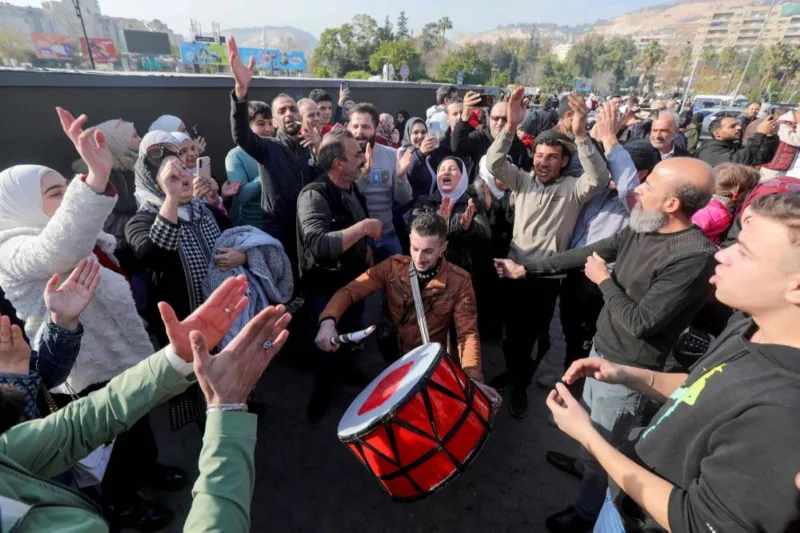
People in Damascus celebrate on Monday. AFP
The US was seeking ways to engage with Syrian rebel groups and is reaching out to partners in the region such as Turkey to start informal diplomacy, Washington said.
Qatari diplomats spoke with HTS on Monday, an official briefed on the developments told Reuters, as regional states race to open contact with the group.
There were tentative signs of a return to order. Syria's banks will reopen on Tuesday, and the oil ministry called on all employees in the sector to head to work on Tuesday, adding that protection would be provided to ensure their safety.
Reuters reporters saw four mini-buses arriving at the Central Bank of Syria, with employees disembarking and walking into the building for their first day of work since Assad’s fall.
"It’s a new shift, it’s a new day, a new year, a new life,” said Sumayra al-Mukli.
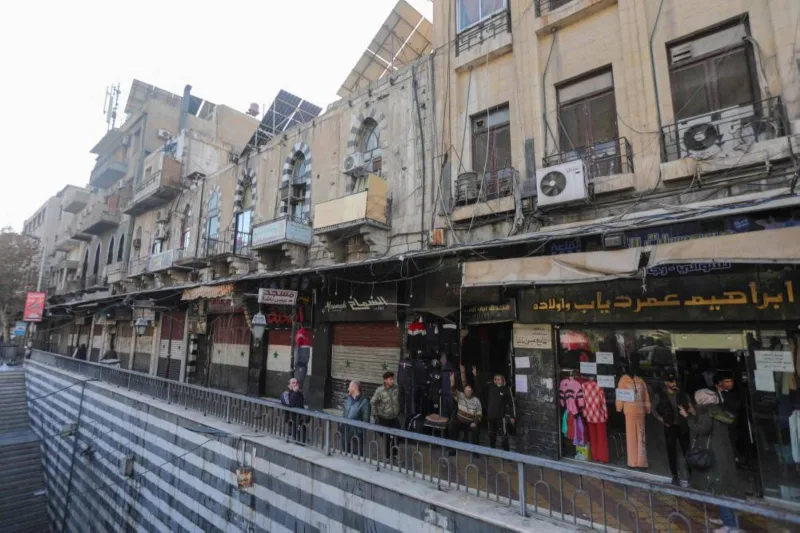
People flash the V for victory sign in the old part of Damascus on Monday. AFP
Golani has vowed to rebuild Syria, and HTS has spent years trying to soften its image to reassure foreign nations and minority groups within Syria.
But fears of reprisals remained. HTS said it will not hesitate to hold security and army officers involved in torturing the Syrian people accountable, describing them as criminals and murderers.
"We will release a list that includes the names of the most senior officials involved in the torturing of the Syrian people," Golani said in a statement. "Rewards will be offered to those who will provide information about senior army and security officers involved in war crimes."
HTS is designated as a terrorist organisation by many states and the UN, and its governing credentials are uncertain.
"Syrians are looking forward to establishing a state of freedom, equality, rule of law, democracy, and we will join efforts to rebuild our country, to rebuild what was destroyed, and to rebuild the future, better future of Syria," Syria's UN Ambassador Koussay Aldahhak told reporters.
Reuters




Syrian opposition fighters pose for a photograph as they celebrate at Umayyad Square in Aleppo, Syria, on Monday. AP
The lightning overthrow of President Bashar Al Assad left Syrians, countries in the region and world powerservous on Tuesday about what comes next as the rebel alliance took its first steps in a government transition.
The United Nations Security Council met behind closed doors late on Monday, and diplomats said they were still in shock at how quickly Assad's overthrow unfolded over 12 days, after a 13-year civil war that was locked in stalemate for years.
"Everyone was taken by surprise, everyone, including the members of the council. So we have to wait and see and watch ... and evaluate how the situation will develop," Russian UN Ambassador Vassily Nebenzia told reporters after the body met.
Russia played a major role in supporting Assad's government and helping it fight the rebels. The Syrian leader fled Damascus for Moscow on Sunday, ending more than 50 years of brutal rule by his family.
With the mood in Damascus still celebratory, Assad's prime minister, Mohammed Jalali, on Monday agreed to hand power to the rebel-led Salvation Government, an administration based in rebel-held territory in northwest Syria.

A man walks near the Commercial Bank of Syria in Damascus on Tuesday. Reuters
The main rebel commander Ahmed al-Sharaa, better known as Abu Mohammed al-Golani, met with Jalali and Vice President Faisal Mekdad to discuss the transitional government, a source familiar with the discussions told Reuters. Jalali said the handover could take days to carry out.
Al Jazeera television reported the transitional authority would be headed by Mohamed al-Bashir, who has headed the Salvation Government.
The steamroller advance of the militia alliance headed by Hayat Tahrir al-Sham (HTS), a former al-Qaeda affiliate, was a generational turning point for the Middle East.
The civil war that began in 2011 killed hundreds of thousands, caused one of the biggest refugee crises of modern times and left cities bombed to rubble, countryside depopulated and the economy hollowed out by global sanctions.
But the rebel alliance has not communicated plans for Syria's future, and there is no template for such a transition in the fractious region.
In an alarming development, Israel seized a buffer zone in the country's south, a move condemned by Egypt, Qatar and Saudi Arabia. Saudi Arabia said the move would "ruin Syria's chances of restoring security".

People shop at the Hamidiyeh market in the old part of Damascus on Monday. AFP
Regional security sources and officers within the now fallen Syrian army said heavy Israeli airstrikes continued against military installations and airbases across Syria overnight, destroying dozens of helicopters and jets, as well as Republican Guard assets in and around Damascus.
The rough tally of 200 raids had left nothing of the Syrian army's assets, they said.
Israel said its airstrikes would carry on for days but told the UN Security Council that it was not intervening in Syria's conflict. It said it had taken "limited and temporary measures" solely to protect its security.
'FREEDOM, EQUALITY, RULE OF LAW'
Oil prices rose more than 1% on Monday, partly on concerns that instability in Syria, which is not a major oil producer, could raise regional tensions, analysts said. "This is an incredible moment for the Syrian people," Deputy US Ambassador to the UN Robert Wood said in New York. "Now we're really focused right now on trying to see where the situation goes. Can there be a governing authority in Syria that respects the rights and dignities of the Syrian population?"

People in Damascus celebrate on Monday. AFP
The US was seeking ways to engage with Syrian rebel groups and is reaching out to partners in the region such as Turkey to start informal diplomacy, Washington said.
Qatari diplomats spoke with HTS on Monday, an official briefed on the developments told Reuters, as regional states race to open contact with the group.
There were tentative signs of a return to order. Syria's banks will reopen on Tuesday, and the oil ministry called on all employees in the sector to head to work on Tuesday, adding that protection would be provided to ensure their safety.
Reuters reporters saw four mini-buses arriving at the Central Bank of Syria, with employees disembarking and walking into the building for their first day of work since Assad’s fall.
"It’s a new shift, it’s a new day, a new year, a new life,” said Sumayra al-Mukli.

People flash the V for victory sign in the old part of Damascus on Monday. AFP
Golani has vowed to rebuild Syria, and HTS has spent years trying to soften its image to reassure foreign nations and minority groups within Syria.
But fears of reprisals remained. HTS said it will not hesitate to hold security and army officers involved in torturing the Syrian people accountable, describing them as criminals and murderers.
"We will release a list that includes the names of the most senior officials involved in the torturing of the Syrian people," Golani said in a statement. "Rewards will be offered to those who will provide information about senior army and security officers involved in war crimes."
HTS is designated as a terrorist organisation by many states and the UN, and its governing credentials are uncertain.
"Syrians are looking forward to establishing a state of freedom, equality, rule of law, democracy, and we will join efforts to rebuild our country, to rebuild what was destroyed, and to rebuild the future, better future of Syria," Syria's UN Ambassador Koussay Aldahhak told reporters.
Reuters
Western Countries Face Dilemma Over Syria’s Blacklisted New Rulers


Syrians wave Syrian and German flags as they rally on December 8 in Berlin to celebrate the end of Bashar al-Assad's rule.
December 10, 2024
By Ray Furlong and Abubakar Siddique
With the dust still swirling after the dramatic collapse of the Syrian government, some Western governments have hinted that they may be open to working with emerging new rulers that they currently consider to be part of a terrorist organization.
Three key European capitals have all indicated that they could change their stance on Hayat Tahrir al-Sham (HTS), the blacklisted Islamist militant group that swept into Damascus on December 8.
This came after comments by U.S. President Joe Biden, reflecting on how the group’s rhetoric had changed as it sought to distance itself from its previous affiliation with Al-Qaeda: "As they take on greater responsibility, we will assess not just their words, but their actions.”
President-elect Donald Trump's immediate response revealed little about how Syria policy might evolve on his watch, beyond stating simply that it is "not our fight." But his administration will also have to decide how to deal with Syria.
"I suspect there's going to be a lot of conversation about what kind of government HTS is going to form," said Fatima Ayub, a Washington-based political analyst and researcher on the Middle East and South Asia.
"Maybe we will see some dynamics like we saw with Sudan, with sanctions relief in return for normalization with Israel. So, there are a lot of big questions on the horizon, and I'm not even sure HTS necessarily has the answers [at this stage]."
It is clear the group's position as a leading player in Syria following the ousting of President Bashar al-Assad presents Western governments with a dilemma. Previously a relatively minor armed group, controlling Syria's northwestern Idlib Province, it was easy to proscribe and largely ignore.
But HTS now appears too important for that, so Western governments seem to be carefully rowing back.
France’s acting foreign minister, Jean-Noel Barrot, told France Info radio on December 8 that HTS was "an Islamist movement” that must “demonstrate its sincere desire to rid the transition of extremism, Islamism, and jihadism." He added that an envoy would leave for Damascus this week.
Germany took a similarly equivocal line. Foreign Ministry spokesman Sebastian Fischer said moves by HTS to distance itself from its past would be judged by its treatment of civilians and ethnic and religious minorities.
In Britain, Cabinet Minister Pat McFadden said a "swift decision" would need to be made about whether to remove HTS from the government's list of designated terrorist organizations.
It is not yet clear what role HTS will play in a post-Assad Syria. But if, as seems likely, it emerges as a key player, Western governments appear keen to keep their options open.
"I think the West should deal with the new reality on the ground," said Dareen Khalifa, a senior adviser at the International Crisis Group.
"They should put forward clear benchmarks for HTS, and if they meet them, they should reconsider their sanctions/designations that will only be an impediment to peace and security to post-Assad Syria."
This approach would differ to that taken toward Taliban-run Afghanistan. There, Western governments have kept their distance from an extremist group whose widespread human rights abuses and severe restrictions on women they have repeatedly condemned.
"I don't see HTS doing things like banning girls from going to school. I think they are more moderate than the Taliban," said U.S.-based analyst Ayub.
"HTS has a lot of questions to ask themselves, because fighting a war is very different than governing a country. And we saw, you know, the Taliban struggle to make this shift in Afghanistan. I still think there are a lot of open questions."
And even as Western governments appeared to shift cautiously on HTS, they have also made it clear that they take nothing on trust. Biden stressed that the group had its own "grim record of terrorism and human rights abuses."
They are also readying for a scenario in which a stable new government fails to emerge, and the threat of a resurgence by the Islamic State (IS) extremist group. On December 8, U.S. officials said warplanes carried out strikes on what they called 75 IS targets in Syria.
Another concern is stocks of chemical weapons held by the Assad government, and whose hands they might now fall into. Israel said it had struck facilities in connection with this.
The situation in Syria also has a potential impact on domestic politics in a number of countries. Millions of Syrians fled the country's devastating civil war that erupted in 2011, and questions are being asked about how many of them will wish -- or be able -- to return home.
Hundreds of them have formed lines on Syria's borders with Lebanon and Turkey. The presence of large Syrian refugee populations has been a source of tension in both countries, as it has been in Europe.
In Germany, it was announced that asylum decisions for Syrians would be frozen until the situation became clearer. A senior opposition figure called for financial incentives for Syrian refugees to return. Interior Minister Nancy Faeser said it was "too soon" for such talk.
December 10, 2024
By Ray Furlong and Abubakar Siddique
With the dust still swirling after the dramatic collapse of the Syrian government, some Western governments have hinted that they may be open to working with emerging new rulers that they currently consider to be part of a terrorist organization.
Three key European capitals have all indicated that they could change their stance on Hayat Tahrir al-Sham (HTS), the blacklisted Islamist militant group that swept into Damascus on December 8.
This came after comments by U.S. President Joe Biden, reflecting on how the group’s rhetoric had changed as it sought to distance itself from its previous affiliation with Al-Qaeda: "As they take on greater responsibility, we will assess not just their words, but their actions.”
President-elect Donald Trump's immediate response revealed little about how Syria policy might evolve on his watch, beyond stating simply that it is "not our fight." But his administration will also have to decide how to deal with Syria.
"I suspect there's going to be a lot of conversation about what kind of government HTS is going to form," said Fatima Ayub, a Washington-based political analyst and researcher on the Middle East and South Asia.
"Maybe we will see some dynamics like we saw with Sudan, with sanctions relief in return for normalization with Israel. So, there are a lot of big questions on the horizon, and I'm not even sure HTS necessarily has the answers [at this stage]."
It is clear the group's position as a leading player in Syria following the ousting of President Bashar al-Assad presents Western governments with a dilemma. Previously a relatively minor armed group, controlling Syria's northwestern Idlib Province, it was easy to proscribe and largely ignore.
But HTS now appears too important for that, so Western governments seem to be carefully rowing back.
France’s acting foreign minister, Jean-Noel Barrot, told France Info radio on December 8 that HTS was "an Islamist movement” that must “demonstrate its sincere desire to rid the transition of extremism, Islamism, and jihadism." He added that an envoy would leave for Damascus this week.
Germany took a similarly equivocal line. Foreign Ministry spokesman Sebastian Fischer said moves by HTS to distance itself from its past would be judged by its treatment of civilians and ethnic and religious minorities.
In Britain, Cabinet Minister Pat McFadden said a "swift decision" would need to be made about whether to remove HTS from the government's list of designated terrorist organizations.
It is not yet clear what role HTS will play in a post-Assad Syria. But if, as seems likely, it emerges as a key player, Western governments appear keen to keep their options open.
"I think the West should deal with the new reality on the ground," said Dareen Khalifa, a senior adviser at the International Crisis Group.
"They should put forward clear benchmarks for HTS, and if they meet them, they should reconsider their sanctions/designations that will only be an impediment to peace and security to post-Assad Syria."
This approach would differ to that taken toward Taliban-run Afghanistan. There, Western governments have kept their distance from an extremist group whose widespread human rights abuses and severe restrictions on women they have repeatedly condemned.
"I don't see HTS doing things like banning girls from going to school. I think they are more moderate than the Taliban," said U.S.-based analyst Ayub.
"HTS has a lot of questions to ask themselves, because fighting a war is very different than governing a country. And we saw, you know, the Taliban struggle to make this shift in Afghanistan. I still think there are a lot of open questions."
And even as Western governments appeared to shift cautiously on HTS, they have also made it clear that they take nothing on trust. Biden stressed that the group had its own "grim record of terrorism and human rights abuses."
They are also readying for a scenario in which a stable new government fails to emerge, and the threat of a resurgence by the Islamic State (IS) extremist group. On December 8, U.S. officials said warplanes carried out strikes on what they called 75 IS targets in Syria.
Another concern is stocks of chemical weapons held by the Assad government, and whose hands they might now fall into. Israel said it had struck facilities in connection with this.
The situation in Syria also has a potential impact on domestic politics in a number of countries. Millions of Syrians fled the country's devastating civil war that erupted in 2011, and questions are being asked about how many of them will wish -- or be able -- to return home.
Hundreds of them have formed lines on Syria's borders with Lebanon and Turkey. The presence of large Syrian refugee populations has been a source of tension in both countries, as it has been in Europe.
In Germany, it was announced that asylum decisions for Syrians would be frozen until the situation became clearer. A senior opposition figure called for financial incentives for Syrian refugees to return. Interior Minister Nancy Faeser said it was "too soon" for such talk.
No comments:
Post a Comment